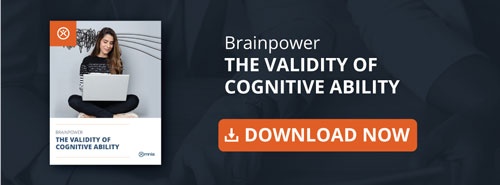What would happen if you introduced an employee cognitive assessment to your workforce? It might raise a few eyebrows. However, if you do it correctly, your workers might embrace it for pre-employment testing.
What an Employee Cognitive Assessment Measures
The candidates look great on paper. You’re trying to test their soft skills by hosting an initial group interview. It lets you narrow down the number of professionals who would be good candidates to fill the open position. With pre-employment testing, you succeed in further narrowing down the field.
You might do so by providing scenarios the ideal candidate would have to handle on the job.
Problem-solving skills. You’re hiring a customer service manager. The scenario involves the sudden influx of a large group of customers that require service. The professional is short-handed and has to assist not only multiple employees but also customers. How will the candidate handle this scenario?
Abstract thinking. The candidate receives a situation scenario that includes the concept of changing product descriptions. They have to apply the new information to the old data that employees and customers had access to all this time. How will the individual explain the changes so that the conversations result in sales or upsells?
Adaptability to changing situations. Being able to adapt is a big deal. Frequently, you don’t know what a candidate is made of until everything goes wrong. In this test scenario, the candidate learns that they are training a group of employees on a new process. However, the computer system crashes. Therefore, the candidate now has to find solutions to this problem while continuing with the training session.
Someone who applies to be a customer service manager needs different technical skills and education than someone who wants to work for you as a registered nurse. Each profession has its own set of hard skills. However, every position requires a certain level of cognitive aptitude. While that level varies by position, the ability to reason, solve problems, and comprehend situations is valuable across the board.
These tests give you something to go on as you narrow down your candidate pool to make the best decision for your organization and department. They will help you separate excellent candidates with high problem-solving and reasoning skills from those without them.
What an Employee Cognitive Ability Test Won’t Do
The testing is a fantastic asset for companies of any size. However, it doesn’t guarantee that the highest-scoring individual is also the best choice for the job. Therefore, you can’t skimp on the other aspects of vetting candidates.
Cases in point are behavioral assessment tests, factoring in job experience, and going through a structured interview process. Only when you combine the results of these disciplines will you be able to have an accurate picture of the individual you’re thinking of adding to your workforce.
Explore: eBooks & Guides
What’s in it for Your Business?
So, why should you spend the money on an employee cognitive ability test? Can’t you just trust your hiring team’s best judgment? The answer is no. Because you need to avoid the revolving door of employee turnover, it’s essential to go through your candidate’s list with a fine-toothed comb. And your hiring managers will appreciate having objective tools to help them make the best final decision.
The cost you expend on attracting and interviewing qualified candidates is already high. Therefore, spend a little extra money on vetting the highest-qualified individuals to ensure that they’re not just a good fit but an excellent one. If you make the right choice here, you might find the candidate with a superb shot at taking advantage of the upward mobility your company offers.
Make a mistake, and you may have someone who’ll be stuck in a position they eventually come to resent. Most importantly, the new hire may leave quickly when it becomes evident that they’re not cut out for the job or moving up. An employee cognitive assessment can help prevent this problem from occurring in the first place.
























